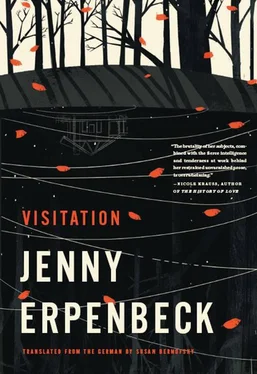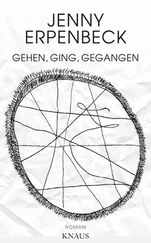Lock the door. Lock the door and leave the key in the lock. He doesn’t want them to break any of his bones. Doesn’t want them to break down the door, twist off or saw apart the ironwork protecting the glass of the front door, this ironwork is painted red and black, just like the ironwork of the National Glider School that he worked on before the war, which was blown up just after the war ended, no one knew why. Lock the door.
His profession used to encompass three dimensions, height, width and depth, it was always his business to build things high, wide and deep, but now the forth dimension has caught up with him: time, which is now expelling him from house and home. We won’t be doing any arresting over the weekend, the official said and let him go, meaning that he wasn’t going to be killed, he was just supposed to leave, get out, scram, make himself scarce, go to the devil: In two hours he’ll be sitting in the S-Bahn that will bring him to West Berlin. Five years at least, the official said, for the ton of screws he bought with his own money in the West to be used in the East, a ton of brass screws for the most important building of his life: on Friedrichstrasse in Berlin-Mitte. A building for the state that is now driving him out. He knows much less than he used to.
That’s his profession: planning homes, planning a homeland. Four walls around a block of air, wresting a block of air from amid all that burgeoning, billowing matter with claws of stone, pinning it down. Home. A house is your third skin, after the skin made of flesh and clothing. Homestead. A house made to measure according to the needs of its master. Eating, cooking, sleeping, bathing, defecating, children, guests, car, garden. Calculating all these whethers, all these thises and thats, in wood, stone, glass, straw and iron. Setting out courses for lives, flooring beneath feet for corridors, vistas for eyes, doors for silence. And this here was his house. For the sitting to be done by his wife and himself, he designed the two chairs with leather cushions, for observing the sunset, he made the terrace with its view of the lake, and their shared pleasure at receiving guests had taken shape as a long table in the main room, the chill he and she felt in winter would be combated by the tiled heating stove from Holland, his and her weariness after ice-skating by the bench beside the stove, and finally his drawing at the drafting table was provided for, as it were, by the studio. And now he had to consider himself lucky he was escaping with his life, suffering his third skin to be stripped from him and fleeing, insides glisteningly exposed, to the safety of the West.
When over the enemy’s lines never forget your own line of retreat. Even in the first war this was easier said than done. They’d been able to discharge their bombs over Paris, but then the airship was struck and gradually lost altitude until finally it settled on the roof of a stable in a Belgian village, burying its own gondola beneath the huge limp sack. When he and his comrades worked their way out from beneath the cloth, they saw a few chickens pecking at the sand down below in the yard, saw a cat sleeping in the sun, and only when the farmers refrained from shooting at him and his comrades but instead fetched a ladder did they know that the village had already been occupied by the Germans. And so it was pure chance that instead of being shot they were invited to climb down a Belgian ladder back into life. From the airship you gazed down at the world as if at a floor plan, but it wasn’t so easy to see where the front was from so high above. To them, the village they owed their life to was occupied territory; to the Belgians, it was home, and quite possibly the front ran right between the whiskers of the sleeping cat. The lesson he learned that day was never to take a risk on so close a call.
He walks around the house to the left, passing the rhododendrons, beneath his feet the gratings with which he covered all the basement windows during the second war. The words “Mannesmann Air Raid Defense” are stamped on these gratings, even now, in the middle of peacetime. By the time the second war came along, he was already too old to be sent into battle, but in his own way he’d expanded his occupied territory. Rule number one for aerial battle: When you attack, keep the sun behind you.
In the morning the sunlight grazed the tops of the pine trees before the house, this meant that the weather would be lovely all day long, the terrace still lay in the shade of the house, and the butter on the breakfast table hadn’t yet begun to melt. All day long, the sun shone on the two meadows to the right and left of the path that led down to the water, the sisters of his wife lay and sat there with their children in the grass playing, sleeping or reading, sunlight spotted the path as it descended amid oak leaves, conifers and hazelnut bushes down to the paved steps, eight times eight, rough sandstone in its natural color; down beside the lake the sunlight pierced the alder foliage only at intervals to reach the black earth of the shoreline, which was still moist, and the closer you came to the glistening surface of the lake, the louder the leaves rustled, the shadier it was all around you — blackout shades, Mannesmann Air Raid Defense — but all of this only in order to blind him, a summer visitor taking his first step out onto the dock, between sunlight and water he would walk toward the end of the dock, and apart from him, the one walking there, nothing else remained that might have cast a shadow. Here the sun unleashed its force, falling upon both him and the lake, and the lake threw its reflection right back up at the sun, and he, who was now sitting or lying at the end of the dock, observed this exchange, casually extracting from his hand a splinter he’d gotten when he sat or lay down, smelled the pine tar used to impregnate the wood, heard the boat plashing in the boathouse, the chain it was bound with faintly clinking, he saw fish suspended in the bright water, crabs crawling, felt the warm boards beneath his feet, his legs, his belly, smelled his own skin, lay or sat there, and since the sun was so bright he closed his eyes. And even through the blood behind his closed eyelids he saw the flickering orb.
If this bit of land, the house and the lake had not signified homeland to him, nothing would have kept him in the Eastern Zone. Now this home had become a trap. At the end of the war he had haggled and drunk with the Russians in Berlin five nights long to keep the machines from being removed from his cabinetry workshop, he had salvaged his architecture office, his business, even during the first wave of expropriations, with Socialist greetings, the rejection letter from Speer had even, in the end, gotten him the commission for the Friedrichstrasse project under the Reds, but now, six years after the end of the war, the Communists were making a grab for his business after all, this had only now occurred to them, suddenly, in the middle of peacetime — Mannesmann Air Raid Defense, always keep your eye on your opponent. Like children with an animal whose nature they are unable to comprehend, they were now ripping the head off this toy and would be surprised to see the thing stop twitching soon thereafter.
All his life he had worked to transform money into something real, he’d at first bought only half of this bit of land and built the house on it, later he’d added the other half with the dock and the little bathing house, his entire savings, earned by hard labor, was grounded here, it had literally put down roots as oaks, alders and pine trees, making an investment is what they used to call it, converting money into durable goods in troubled times, that’s what he’d been taught, but unfortunately what he’d been taught had recently become unmoored from reality, and in the wondrous disorder that the Russians left behind for the Germans one could only pity a person who owned a piece of land and not a flying carpet.
Читать дальше












